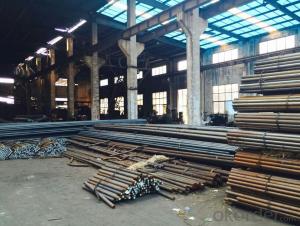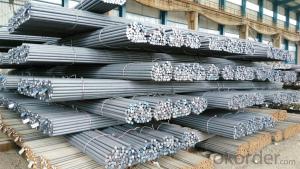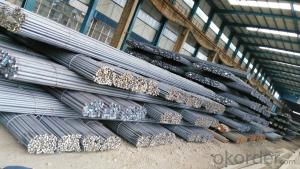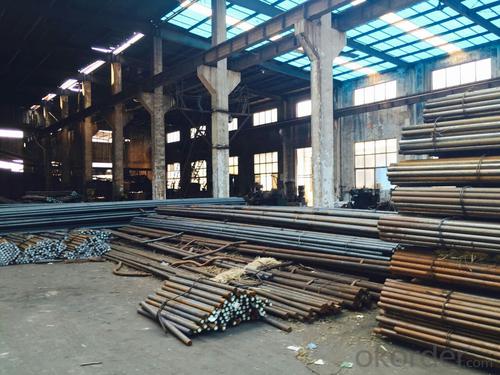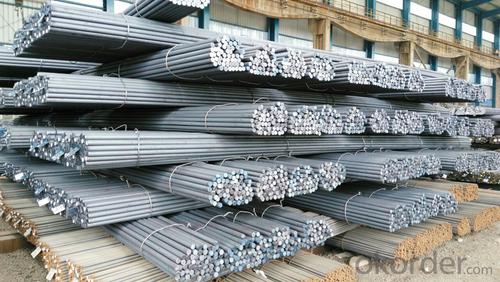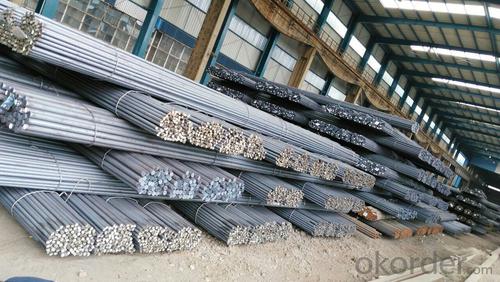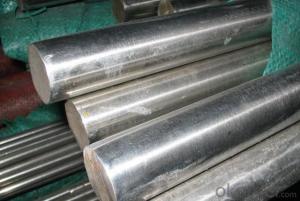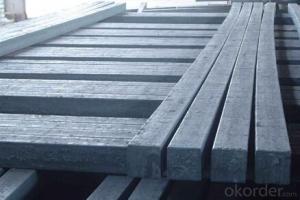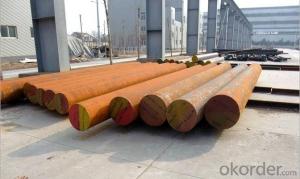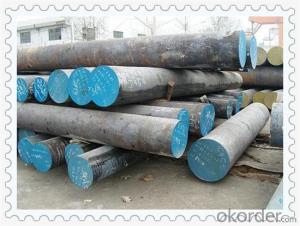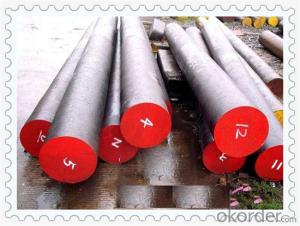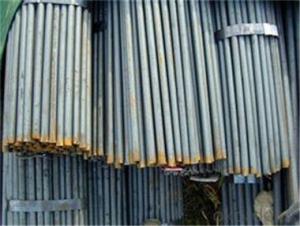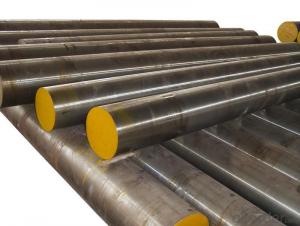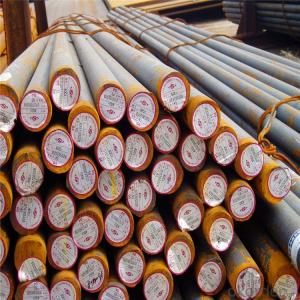45# Carbon Steel Hot Rolled Bars Forged Bars
- Loading Port:
- Tianjin
- Payment Terms:
- TT OR LC
- Min Order Qty:
- 25 m.t.
- Supply Capability:
- 50000 m.t./month
OKorder Service Pledge
OKorder Financial Service
You Might Also Like
Specification
45# Carbon Steel Hot Rolled Bars Forged Bars
Product Details:
Name:45# Carbon Steel Hot Rolled Bars Forged Bars
Place of Origin:Liaoning,China Brand Name:Dongbei Tegang
Shape:round bar Material: Alloy Structural Steel
Steel Grade: AISI 1045/JIS S45C/DIN C45/GB 45
Size:Diameter:16mm~350mm
Application:used in making high strengthened and wear resistant parts that works under high pressure, like axle, spring ring, axletree, cam, and steel sling etc.
Chemical Composition:
C | Si | Mn | Cr | Ni | Cu | P | S |
0.38-0.43 | 0.17-0.37 | 0.50-0.80 | ≤0.25 | ≤0.30 | ≤0.35 | ≤0.035 | ≤0.035 |
Characteristics:
- High hardness, strength and toughness.
- Poor plasticity during cold deformation.
- Medium machinability.
- Poor weldability.
- Poor hardenability.
- Cracks is often caused during water quenching process.
- Large parts should be in normalizing treatment.
Application:
45# Carbon Steel Hot Rolled Bars Forged Bars can be used to be manufactured roller, shaft, tyre, spring ring, damping spring, clutch and steel wire rope, etc.
Product Show:
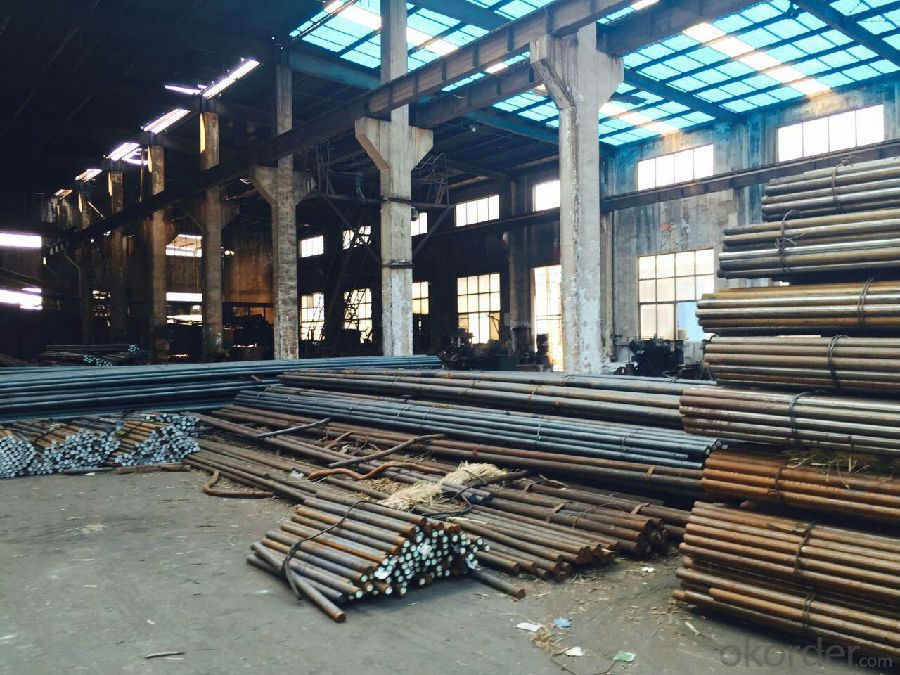
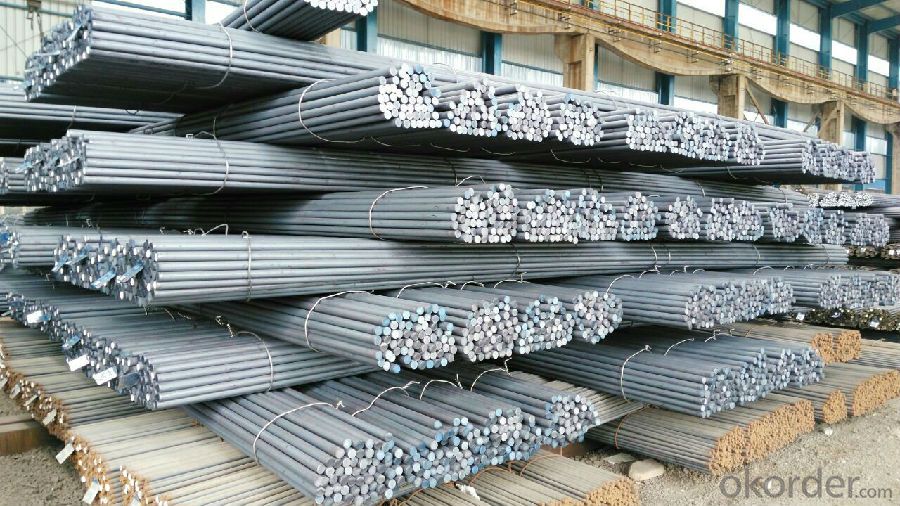
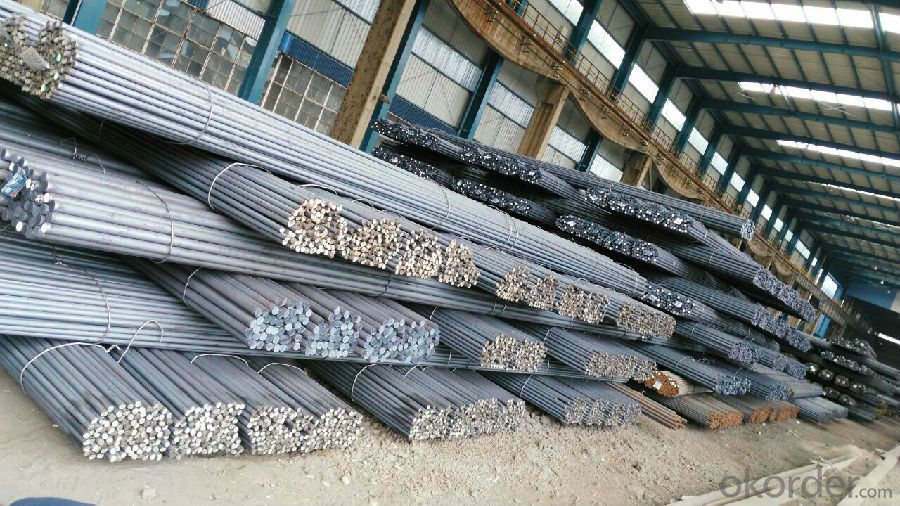
- Q: Can special steel be used for electrical applications?
- Yes, special steel can be used for electrical applications. Special steel alloys, such as stainless steel or electrical-grade steels, are often used in electrical applications due to their excellent electrical conductivity, resistance to corrosion, and high strength properties. These steels are commonly utilized in the manufacturing of electrical components, wiring, transformers, and various electrical equipment.
- Q: What are the applications of special steel in the nuclear supply chain?
- Special steel has numerous applications in the nuclear supply chain. It is used in the construction of nuclear reactors, where it provides the necessary strength and resistance to extreme temperatures and pressures. Special steel is also utilized in the manufacturing of fuel rods, containment vessels, and other critical components that require high durability and corrosion resistance. Additionally, special steel is employed in the production of storage containers for nuclear waste and in the construction of transportation casks for the safe transport of radioactive materials.
- Q: How does special steel perform in low-temperature applications?
- Special steel performs well in low-temperature applications due to its unique properties such as high strength, toughness, and resistance to brittleness. It retains its mechanical properties even at extremely cold temperatures, making it ideal for industries like aerospace, automotive, and energy where materials need to withstand challenging environments.
- Q: What are the requirements for special steel used in oil and gas equipment manufacturing?
- Due to the demanding operating conditions and harsh environments that oil and gas equipment encounters, the requirements for special steel used in their manufacturing are extremely strict. These materials must meet several key requirements: 1. Excellent resistance to corrosion is essential for the special steel used in oil and gas equipment. This is particularly important in the presence of corrosive fluids like oil, gas, and saltwater. By preventing degradation and premature failure, corrosion resistance ensures the equipment's longevity. 2. The steel must possess high strength and toughness to withstand the extreme pressures, temperatures, and mechanical stresses encountered during oil and gas operations. This ensures that the equipment can perform reliably in demanding conditions. 3. Special steel used in oil and gas equipment must maintain its mechanical properties and structural integrity even at high temperatures, as these processes often involve elevated temperatures. 4. Weldability is an important aspect of special steel used in oil and gas equipment manufacturing. It should allow for efficient and reliable welding processes without compromising the equipment's overall strength and integrity. 5. Good fatigue resistance properties are necessary for special steel used in oil and gas equipment, as cyclic loading can lead to fatigue failure if the material is not designed to withstand repetitive stresses. 6. In applications like offshore drilling or arctic environments, where extremely low temperatures are encountered, the special steel should exhibit excellent toughness and ductility to prevent brittle fracture. 7. The chemical composition of the special steel must be tightly controlled to ensure consistent and predictable material properties. This involves strict control over the levels of various alloying elements, impurities, and trace elements to meet the specific requirements of the oil and gas industry. Meeting these requirements is crucial for the safe and reliable operation of oil and gas equipment. Special steel manufacturers collaborate closely with industry standards and specifications to develop and provide materials that meet these demanding requirements, ensuring the integrity and performance of the equipment in the oil and gas sector.
- Q: How does special steel perform in cryogenic applications?
- Special steel performs well in cryogenic applications due to its ability to maintain its mechanical properties at extremely low temperatures. It has a low thermal expansion coefficient, high strength, and excellent toughness, which are essential characteristics for withstanding the extreme conditions of cryogenic environments. Additionally, special steel exhibits good resistance to corrosion and oxidation, making it suitable for use in cryogenic applications where exposure to low temperatures and cryogenic fluids is common.
- Q: What are the main industries that use special steel?
- The main industries that use special steel include automotive, aerospace, construction, energy, machinery, and tool manufacturing.
- Q: How does special steel perform in cryogenic gas environments?
- Special steel performs well in cryogenic gas environments due to its low temperature resistance and high strength. It has excellent toughness and can withstand extreme cold temperatures without becoming brittle or undergoing significant deformation. This makes it ideal for applications such as cryogenic storage tanks, pipelines, and equipment used in industries like aerospace, energy, and scientific research, where materials need to maintain their integrity and performance in extremely cold conditions.
- Q: Can special steel be used in the food processing industry?
- Yes, special steel can be used in the food processing industry. Special steel, such as stainless steel, is commonly used in food processing equipment and utensils due to its corrosion resistance, durability, and ability to maintain hygiene standards. It is suitable for applications that require frequent cleaning, exposure to moisture, and contact with food, ensuring the safety and quality of food processing operations.
- Q: How do alloying elements affect the properties of special steel?
- Alloying elements play a crucial role in determining the properties of special steel. By adding specific elements to the steel composition, various desirable characteristics can be achieved. Firstly, alloying elements can improve the strength and hardness of the steel. For example, elements like chromium, nickel, and molybdenum enhance the steel's resistance to deformation and improve its overall toughness. This is particularly important in applications where the steel needs to withstand high temperatures, pressure, or mechanical stress. Moreover, alloying elements can enhance the corrosion resistance of special steel. Elements such as chromium, nickel, and copper create a protective oxide layer on the surface of the steel, which prevents it from rusting or corroding. This is particularly important in industries such as marine, oil and gas, and chemical processing, where exposure to corrosive environments is common. Additionally, alloying elements can influence the steel's ability to be welded, machined, or heat treated. For instance, elements like manganese and silicon improve the weldability of steel, making it easier to join different components together. On the other hand, elements like vanadium and tungsten increase the steel's ability to retain its hardness even after being subjected to high temperatures, making it suitable for applications involving heat treatment. Furthermore, alloying elements can impact the steel's electrical and magnetic properties. Elements like nickel and cobalt can enhance the steel's magnetic properties, making it suitable for applications in electrical transformers or magnetic devices. Conversely, elements like aluminum and titanium can improve the steel's electrical conductivity, making it ideal for electrical wiring or conductive components. In summary, alloying elements have a significant impact on the properties of special steel. They can enhance its strength, hardness, corrosion resistance, weldability, heat treatability, electrical conductivity, and magnetic properties. By carefully selecting and controlling the alloying elements, manufacturers can tailor the steel's properties to meet the specific requirements of various industries and applications.
- Q: What are the properties of high-strength steel?
- High-strength steel has several key properties that make it desirable for various applications. It possesses exceptional strength, allowing it to withstand heavy loads and resist deformation under stress. It also exhibits excellent toughness, meaning it can absorb energy without fracturing. Additionally, high-strength steel typically offers high hardness, good wear resistance, and enhanced corrosion resistance. Its properties make it ideal for use in industries such as automotive, aerospace, construction, and manufacturing, where durability and reliability are crucial.
Send your message to us
45# Carbon Steel Hot Rolled Bars Forged Bars
- Loading Port:
- Tianjin
- Payment Terms:
- TT OR LC
- Min Order Qty:
- 25 m.t.
- Supply Capability:
- 50000 m.t./month
OKorder Service Pledge
OKorder Financial Service
Similar products
Hot products
Hot Searches
Related keywords
